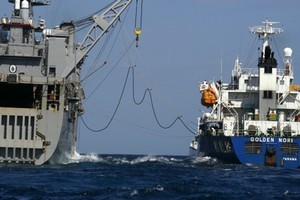Piracy costs maritime industry $16bn+
by Jeni Bone on 23 Aug 2008

US, Canadian and other ally countries have banded together to provide armed escort services and act as a deterrent in perilous regions. MIAA
Just like their forebears from the 16th to 18th centuries, modern day pirates are on the prowl in the waters off Africa and Asia, these days using high-tech equipment and para-military methods to target commercial liners and ships for robbery and ransom.
The world currently transports 80% of all international freight by sea. More than 10 million cargo containers are moving across the world's oceans at any one time.
The heavy ocean traffic (and its cargo) spawned a surge in sea piracy and a new breed of pirates, the bloodiest the world has seen. More than 2,400 acts of piracy were reported around the world between 2000 and 2006, roughly twice the number reported for the preceding six-year period.
Although pirate attacks have at least tripled during that time period, the actual number of attacks is not known. All forms of international monitoring of sea piracy acknowledge that the statistics are scarcely accurate.
The Australian government estimates the actual number of piracy attacks is 2,000% higher. Piracy is estimated to cost between $13 and $16 billion every year and could cost substantially more in coming years.
Shipping companies frequently do not report attacks out of concern that it could increase insurance premiums.
Ships loaded with palm oil, plywood, natural gas, and supertankers carrying all manner of freight are seen as an easy way to make money.
The 'pirates', heavily armed and ruthless, board the vessels and capture the Captain and Chief Engineer, along with all the ship’s logs, knowing they can demand around US$50,000 for each of the senior crew.
Forget the stereotypes of colourful old salts. These are well-organised gangs, armed with AK-47s, speedboats, satellite phones and global positioning systems to plunder gas tankers, fishing ships, ships carrying aid to tsunami and cyclone-affected regions and commercial boats.
Experts say, thanks to the lucrative hauls of such escapades, the line between the regional law enforcers and pirates has become blurred, tempting corrupt local officials to not only turn a blind eye for a cut of the bounty, but also get involved with sequester and stealing.
Off Acheh in the Malacca straits, the second busiest shipping route in the world, there have been reports of gun battles on oil tankers, and the use of rocket-propelled grenades, which to date have not resulted in a major disaster.
Maritime piracy, according to the United Nations Convention on the Law of the Sea (UNCLOS) of 1982, consists of any criminal acts of violence, detention, or depredation committed for private ends by the crew or the passengers of a private ship or aircraft that is directed on the high seas against another ship, aircraft, or against persons or property on board a ship or aircraft. Piracy can also be committed against a ship, aircraft, persons, or property in a place outside the jurisdiction of any state.
Industry experts have suggested the ships in the areas most at risk should be permitted to carry arms, and while some government vessels and supertankers travel with escorts or onboard security staff if their course crosses pirate territory, and ships carrying nuclear waste on the Pacific can also carry Atomic Energy Authority police, to date the carriage of weapons, even for self-defense would be a breach of existing international treaties.
Somalia's 3,300-kilometer (2,060-mile) coastline is considered one of the world's most dangerous stretches of water because of piracy.
The number of attacks on vessels more than tripled last year to 31 incidents, compared with 10 a year earlier, according to the International Maritime Bureau. The agency has advised all vessels to stay at least 200 nautical miles (370 kilometers) from the Somali coast.
On April 4, 2008, the luxury French yacht Le Ponant was crossing the Gulf of Aden between Yemen and Somalia when a posse of high-tech speed boats surrounded the 32-cabin, three-masted vessel. Somali pirates stormed the yacht, hijacking the vessel and taking its 30 crew hostage.
A week of intense negotiations followed, ending with the release of the hostages to French military officials in exchange for an undisclosed ransom. Shortly after, a team of French commandos tracked the pirates to a remote location in northern Somalia, arresting them.
Somalia is only the latest hot spot in a worldwide renaissance of sea piracy. The growth of global commerce in the past two decades crowded the oceans with cargo vessels, dry-bulk carriers and supertankers loaded with every good imaginable.
The potential of a disastrous environmental spill resulting from an attack finally forced the international community to clamp down on sea piracy.
International law allows any government vessel to repress an act of piracy in international waters. On October 30, 2007, two American destroyers, the USS Porter and the USS Arleigh Burke, attacked and sank two Somali pirate vessels after the pirates captured the Japanese tanker, Golden Mori.
But Somalia is a relative latecomer to contemporary sea piracy. Since 2000, southeast Asia has had the most dangerous waters in the world. Malaysia and the islands of the Indonesian archipelago have seen the lion's share of sea piracy since 2000. And there’s plenty of danger in the waters off Nigeria and Iraq.
'The truth is that modern piracy ... is a violent, bloody, ruthless practice,' said Captain Jayant Abhyankar, Deputy Director of the International Maritime Bureau at a conference in Singapore last year.
'It’s made the more fearsome by the knowledge on the part of the victims that they are on their own and absolutely defenseless and that no help is waiting just round the corner.'
If you want to link to this article then please use this URL: www.sail-world.com/48105